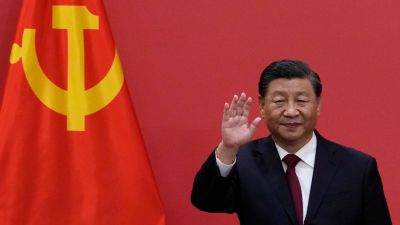China's Xi expands powers, promotes allies

ITV News Asia correspondent Debi Edward reports
President Xi Jinping, China’s most powerful leader in decades, increased his dominance when he was named to another term as head of the ruling Communist Party in a break with tradition and promoted allies who support his vision of tighter control over society and the struggling economy.
Xi, who took power in 2012, was awarded a third five-year term as general secretary, discarding a party custom under which his predecessor left after 10 years.
The 69-year-old leader is expected by some to try to stay in power for life.
On Saturday, Xi’s predecessor, 79-year-old Hu Jintao, abruptly left a meeting of the party Central Committee with an aide holding his arm.
That prompted questions about whether Xi was flexing his powers by expelling other leaders. The official Xinhua News Agency later reported Hu was in poor health and needed to rest.
The party also named a seven-member Standing Committee, its inner circle of power, dominated by Xi allies after Premier Li Keqiang, the number two leader and an advocate of market-style reform and private enterprise, was dropped from leadership. That was despite Li being a year younger than the party's informal retirement age of 68.
Xi and other Standing Committee members appeared for the first time as a group before reporters in the Great Hall of the People, the seat of China's ceremonial legislature in central Beijing.
Leadership changes were announced as the party wrapped up a twice-a-decade congress that was closely watched for signs of initiatives to reverse an economic slump or changes in a severe “zero-Covid” strategy that has shut down cities and disrupted business.
Officials disappointed investors and the Chinese public by announcing no changes.
The new line-up appeared to reflect what some commentators called “Maximum Xi,” valuing loyalty over ability. Some new leaders lack national-level experience as vice premier or Cabinet minister that typically is seen as a requirement for the post.
None of the members are a woman or ethnic minority. The Central Committee includes 11 women, or about 5% of the total.
Party plans call for creating a prosperous society by mid-century and restoring China to its historic role as a political, economic and cultural leader.
Those ambitions face challenges from security-related curbs on access to Western technology, an aging workforce and tension with Washington, Europe and Asian neighbours over trade, security, human rights and territorial disputes.
Xi has called for the “great rejuvenation of the Chinese nation” and a revival of the party’s “original mission” as social, economic and culture leader in a throwback to what he sees as a golden age after it took power in 1949.
During the congress, Xi called for faster military development, more technology self-reliance and defence of China’s interests abroad, which raises the likelihood of further conflict.
The party has tightened control over entrepreneurs who generate jobs and wealth, prompting warnings that rolling back market-oriented reforms will weigh on economic growth that sank to 2.2% in the first half of this year, less than half the official 5.5% target.
Xi said the party would build “self-reliance and strength” in technology. He gave no indication of possible changes in policies that prompted then-President Donald Trump to launch a tariff war with Beijing in 2018 over its technology ambitions.
Trump’s successor, Joe Biden, has kept punitive tariff hikes on Chinese goods and this month increased restrictions on China's access to US chip technology.
Xi gave no indication Beijing will change its “zero-Covid” strategy despite public frustration with repeated city closures that has boiled over into protests in Shanghai and other areas.
Xi’s priorities of security and self-sufficiency will “drag on China’s productivity growth,” said Julian Evans-Pritchard, Sheana Yue and Mark Williams of Capital Economics in a report. “His determination to stay in power makes a course correction unlikely.”
Ahead of the congress, banners criticising Xi and “zero COVID” were hung from an elevated roadway over a major Beijing thoroughfare in a rare protest. Photos of the event were deleted from social media. The popular WeChat messaging app shut down accounts that forwarded them.
Xi’s government also faces criticism over mass detentions and other abuses against mostly Muslim ethnic groups and the jailing of government critics.
Want a quick and expert briefing on the biggest news stories? Listen to our latest podcasts to find out What You Need To Know.